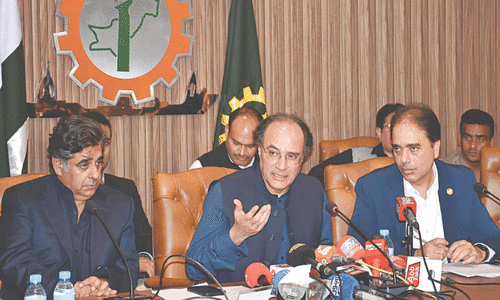ISLAMABAD: Claiming completion of almost all prior action before time and reaching an agreement, in principle, with all provinces over agricultural income tax, Finance Minister Muhammad Aurangzeb sounded hopeful on Thursday that talks with the International Monetary Fund (IMF) would yield a deal on a $6bn Extended Fund Facility (EFF) this month.
The government will subsequently request the lender to augment the package with a climate resilience facility (CRF).
Talking to journalists after briefing an in-camera meeting of the National Assembly’s Standing Committee on Finance & Revenue about the IMF negotiations, the finance minister said Pakistan wanted to secure more than $6bn EFF from IMF. Syed Naveed Qamar, a PPP member and former finance minister, presided over the meeting.
The finance minister said the government had met almost all prior actions and hopefully the new programme would be concluded this month. In reply to a question, the minister said the EFF’s size had not been finalised, but once it is in place, the government would approach the IMF staff for its augmentation with CRF on the eve of the first quarterly review.
Muhammad Aurangzeb said climate financing did not come up during ongoing discussions on EFF. The CRF is a relatively new facility carrying about $50bn total initial contributions from rich countries, at low rates, to help nations vulnerable to climate change carry out reforms for climate resilience.
The finance minister said the provinces had agreed “in principle” over income tax on agriculture, but since it was a provincial subject its process could not be completed without detailed consultations with them.
Later, Mr Naveed Qamar said it was not a question of agreement or resistance, but since “we want to take a step that has not been taken for so many years”, resistance to income tax on agriculture was understandable.
The finance minister agreed during the committee meeting that inflation was expected to increase slightly, but there was still room for reduction in the policy rate of the State Bank. He said central banks around the world did not like to reduce the policy rates which could go up soon and hence they take time.
Macroeconomic indicators
Muhammad Aurangzeb said macroeconomic indicators had improved in recent months and the IMF programme had helped restore financing from other multilaterals, as evident from recent approvals for the Dasu Dam by the World Bank.
“Nothing is being controlled artificially, there is no restriction on imports and all assumptions about devaluation have died down.”
The minister said tax had been imposed on real estate, as well as developers and retailers and pressures were being mounted from all segments as everyone wanted to stay away from the tax net.
Mr Aurangzeb said the IMF had asked for eliminating presumptive tax and tax on exporters was introduced because of that reason. “Exporters are worried, but we also have our own compulsions,” he said.
But all tax refunds were being paid to exporters and more than Rs260bn had been cleared so far, the minister said.
In reply to a question from a parliamentarian, the minister said a contributory pension system had been introduced for civil employees with effect from July 1 and it would be followed by a similar regime for the armed forces with effect from July 1 next year, since the government had to look into their service structure.
He said five ministries would be wound up during the current fiscal year.
Finance Secretary Imdadullah Bosal told the committee that government estimates put the unemployment rate at 6.3pc in 2020-21 while the World Bank estimated it at 10.3pc, compared to 8pc by the IMF and 8.2pc by the International Labour Organisation.
Published in Dawn, July 12th, 2024















































Dear visitor, the comments section is undergoing an overhaul and will return soon.